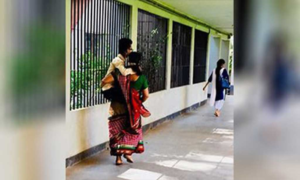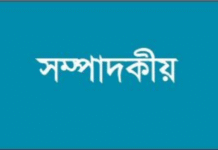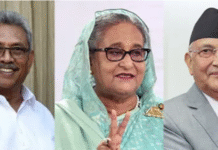A Research Project on People with Disability (PwD) and their economic and social empowerment: the case of Bangladesh
Debashis Sarker[1]
According to World Health Organization (2011), fifteen percent of the world’s population are estimated to have some form of disability. Over the years the number of People with Disability (PwD) is rising due to several factors including an aging population, chronic health issues, accidents and war. A large number of PwD live in the global south and mostly in rural areas. PwD are ‘grossly overrepresented amongst the poor’ irrespective of the definitions used for understanding disability and also, they are, in many cases, treated as not “real people”. They experience stigma, prejudice, and social exclusion and do not get access to social network, educational facilities, and legal rights. They have very limited access to information and the vast majority live with a lower quality of life.
The recently adopted 2015-2030 United Nations Sustainable Development Goals (SDGs) have highlighted the importance of inclusiveness (“Leaving no one behind”) in development and in order to emphasize its urgency refers to PwD 11 times to include them in development by providing them with access to education, health, income, credit, employment and with capacity building initiatives for self-employment. The United Nations Convention on the Rights of the Persons with Disabilities (UNCRPD) which Bangladesh has since ratified, outlines the rights of PwD and the Article 8 of the Convention draws attention to the importance of gendered perspectives on PwDs and because of uniqueness the importance of interventions that are specific to the female PwDs.
Bangladesh and PwDs
Bangladesh’s statistics on disability are highly contested and vary widely across studies and surveys and this is mainly due to the lack of a common definition of disability. For example, according to the Bangladesh Bureau of Statistics (BBS) proportion of PwDs to the total population was 9.01% in 2010. Whereas the national population and housing census of 2011 has put the figure at 1.4% of total population. Again, the latest BBS (2016) survey identified 6.94% of total population as PwDs, a drop of almost 4% since 2010. Confusions with the number are also due to under representation in national statistics – PwDs are often overlooked in government’s policy initiatives.
Like in most traditional societies, PwDs also suffer marginalization and neglect due to social, and cultural beliefs. In many such societies PwDs are stigmatized. In Bangladesh in some religion disability is regarded as an outcome of ‘karma’ or deeds of their past lives and thus disability is a divine curse.
Among the PwDs that are poor are the worst sufferers and are disadvantaged both economically as well as socially. Disability limits their capacity to access jobs and other livelihood options that people without disability do. The poor PwDs are trapped in a vicious cycle of poverty, marginalization, deprivations, isolation and powerlessness.
In order to address the challenges the PwDs face in Bangladesh, government passed in 2013 the Rights and Protection of the Persons with Disabilities Act. The Act has incorporated most of the provisions of the UNCRPD and acknowledges the rights of PwDs and their equal participation in society, without discrimination. The Bangladesh Ministry of Social Welfare has been tasked to coordinate and implement the Act. Under the government social safety net programme, PwDs are expected to get financial allowances and loan facilities and students with stipends and schools are expected to get grants to facilitate education of student PwDs.

In Bangladesh, a mother is carrying her physically disabled son for an admission test at a university – BBC has included this mother in its ‘100 Women’ list of the world. Source: The Guardian
However, the Act and the provisions have not automatically translated into actions. The realities on the ground are little different. Lack of proper coordination among various implementing agencies and service providers impede delivery of services. Furthermore, lack of knowledge of whereabouts of PwDs, their numbers, locations, nature of disability etc. etc. also fail to reach benefits especially to participate in government’s social safety nets programs meant for PwDs. Moreover, as very few public places are PwD friendly these are not accessible to them that in turn also constrain their capacity to avail services. Situation is much worse for the women PwDs.
Indeed while government’s thoughts, ideas and policies concerning the PwDs have been in the right direction, actual implementation of these policies has remained a problem. For example, government has rightly appreciated that among other things, financial inclusion of PwDs through provisioning of credit/microcredit especially to those that are poor but have the capacity to run businesses has the potential to empower them economically and thereby, socially. Accordingly, government made provisions for the PwDs to obtain credits, on easy terms, from all existing financial service providers and microfinance institutions including the banks and the Bangladesh Bank, the central bank of Bangladesh, has made relevant provisions for the commercial banks to provide credit to eligible PwDs with lower interest rate. But not many PwDs have succeeded in taking advantage of these facilities and this is mainly because many PwDs when they approach banks for loans are treated indifferently if not with disdain and this is mainly because the banks that are commercial institutions are risk averse and thus are less inclined to offer loans to PwDs that they regard as high risk propositions.
While commercial banks have been less enthusiastic some NGOs such as BRAC, a leading NGO in Bangladesh that among other things also specialises in microcredit has come forward and taken initiatives to provide microfinance to ‘economically active’ but poor PwDs to help them to overcome poverty through self-run microenterprises and in the process empower them both economically as well as socially. This is a pioneering initiative and this is because while microcredit has had successes in alleviating poverty in many parts of the world, inclusion of PwDs in the programme is new and thus warrant constant in-depth research and monitoring of the initiative so that the lessons learnt can contribute to improving the programme quality and more generally, finding options and tools that are relevant to empowering the PwDs.
University of Queensland’s Research on PwDs and Expected Outcomes
The author of this article, a PhD scholar at the School of Social Sciences of the University of Queensland, Australia is conducting such a research which in the context of Bangladesh and its socio-economic, governance and cultural contexts, is examining the relationship between financial inclusion of PwDs – through BRAC’s microfinance programme for the PwDs – and their economic and social empowerment, if any. Preliminary findings reveal following general scenario about the governance and cultural frameworks within which the PwDs in Bangladesh function: firstly, there are confusions with regard to definition of PwDs – different organizations use different definitions and this has resulted in different agencies producing different statistics on PwDs, distorting target group coverage, policy formulation and provisioning of services; and secondly, institutional ineptness and also norms and values that influence attitudes of people towards PwDs that are more condescending than empathising contribute on the one hand, to discrepancies between policies and implementation and on the other, apathy. Empowerment initiatives must factor in these institutional and cultural issues.
In summary, by focusing on BRAC’s microfinance for PwDs and by contextualizing the initiative within the overall institutional and cultural contexts of Bangladesh this research project at the University of Queensland, Australia is endeavouring to promote a theoretical construct that would have the potential to indicate whether financial inclusion alone can contribute to economic and social empowerment of the PwDs that are poor. In order to understand better a gendered perspective of empowerment of PwDs the Project is also making male/female distinctions in its research. It is believed that the findings of the research would greatly help in bridging the gap between social, institutional and economic dynamics of the PwDs and policies and also between policies and implementation and more importantly, between policies, actions and empowerment and inclusive development of the PwDs. It is also believed that generic lessons learnt from this Bangladesh project would equally contribute to practical policy and advocacy options that are key to addressing the issues of empowerment of PwDs, globally and thus advancing the goals of SDGs that are specific to PwDs, namely, Goals 4, 8, 11 and 17.
[1] Mr. Debashis Sarker is a Research Scholar at the School of Social Sciences, University of Queensland, Brisbane, Australia. Debashis Sarker can be reached at: d.sarker@uq.net.au









